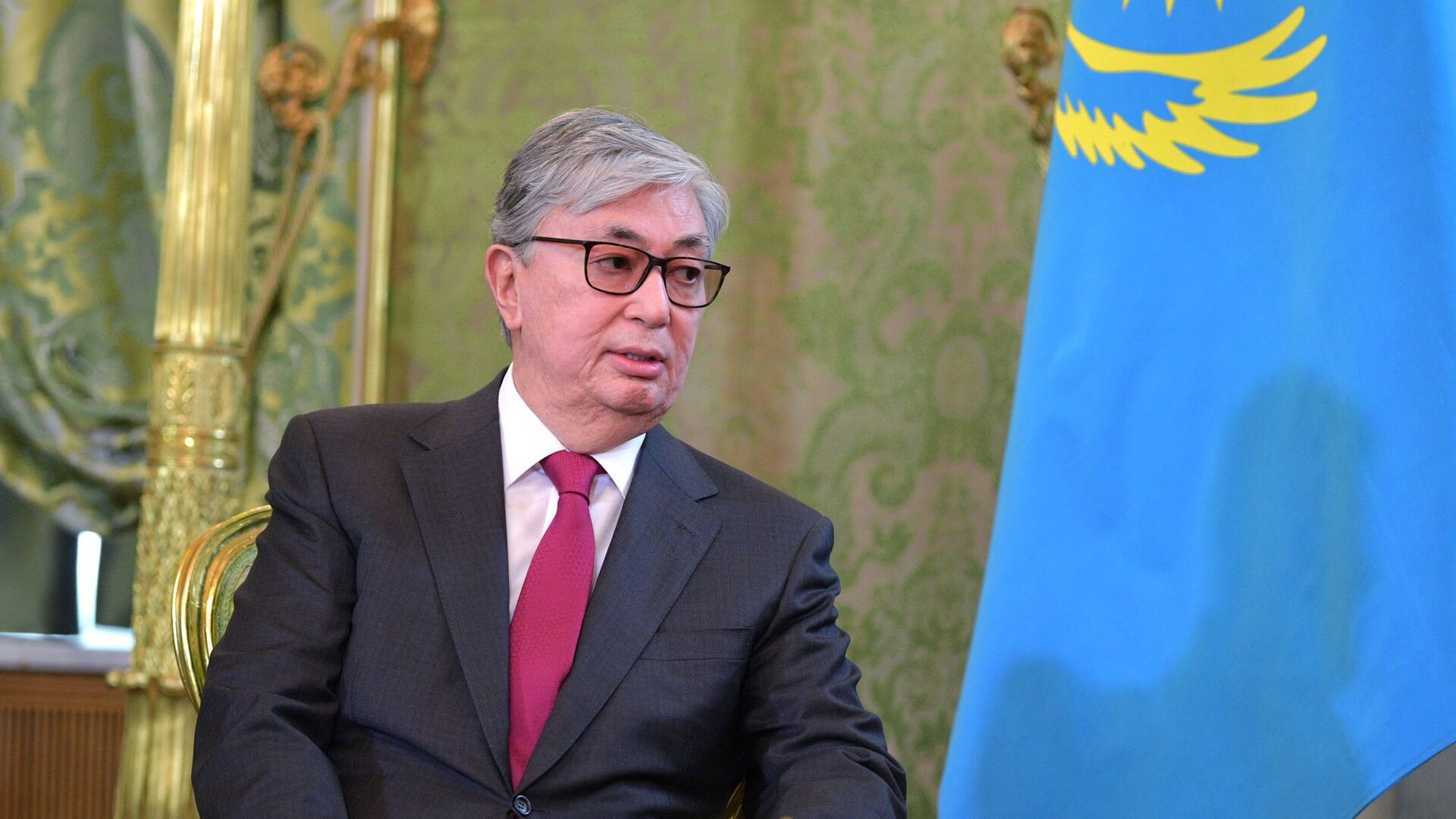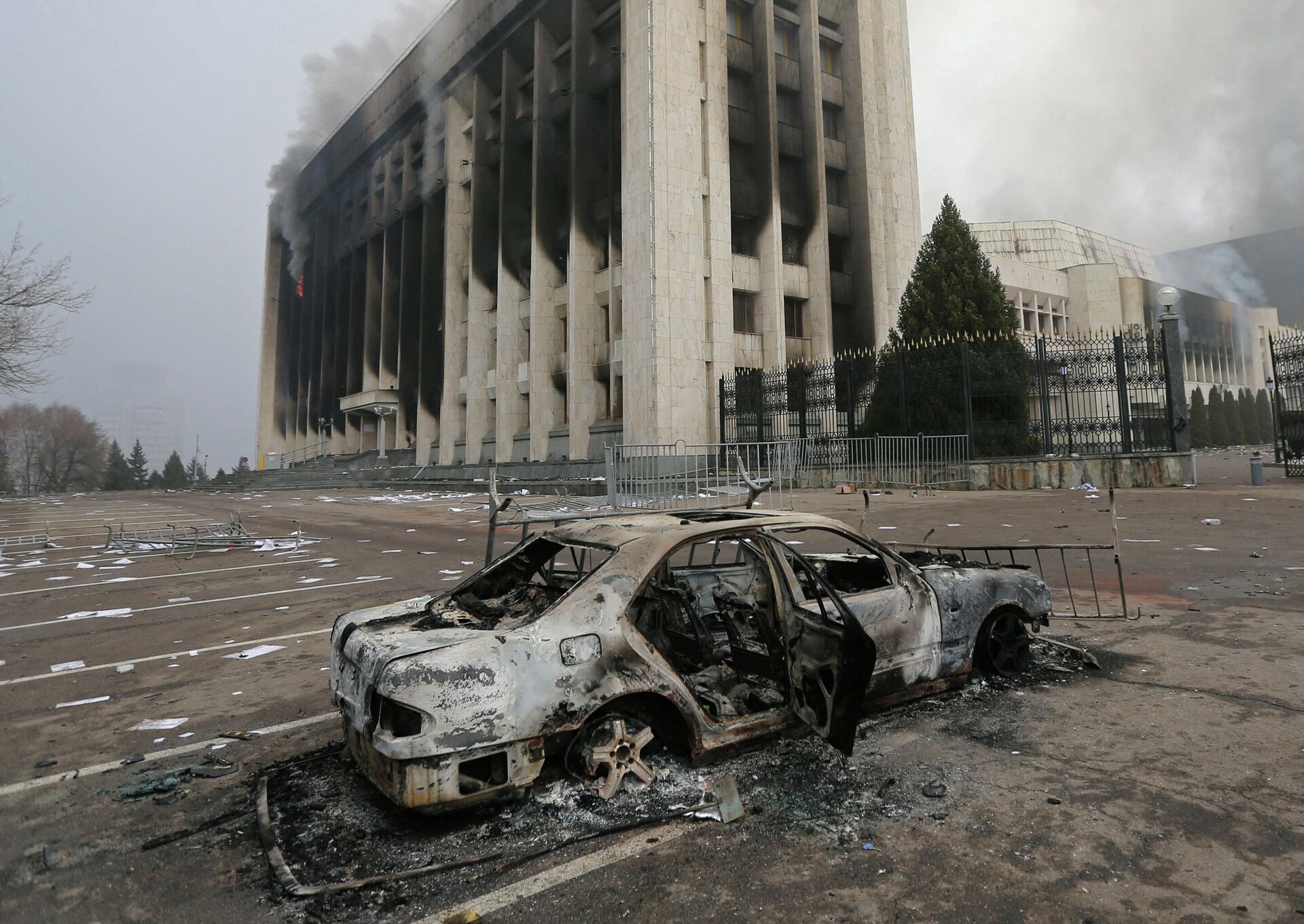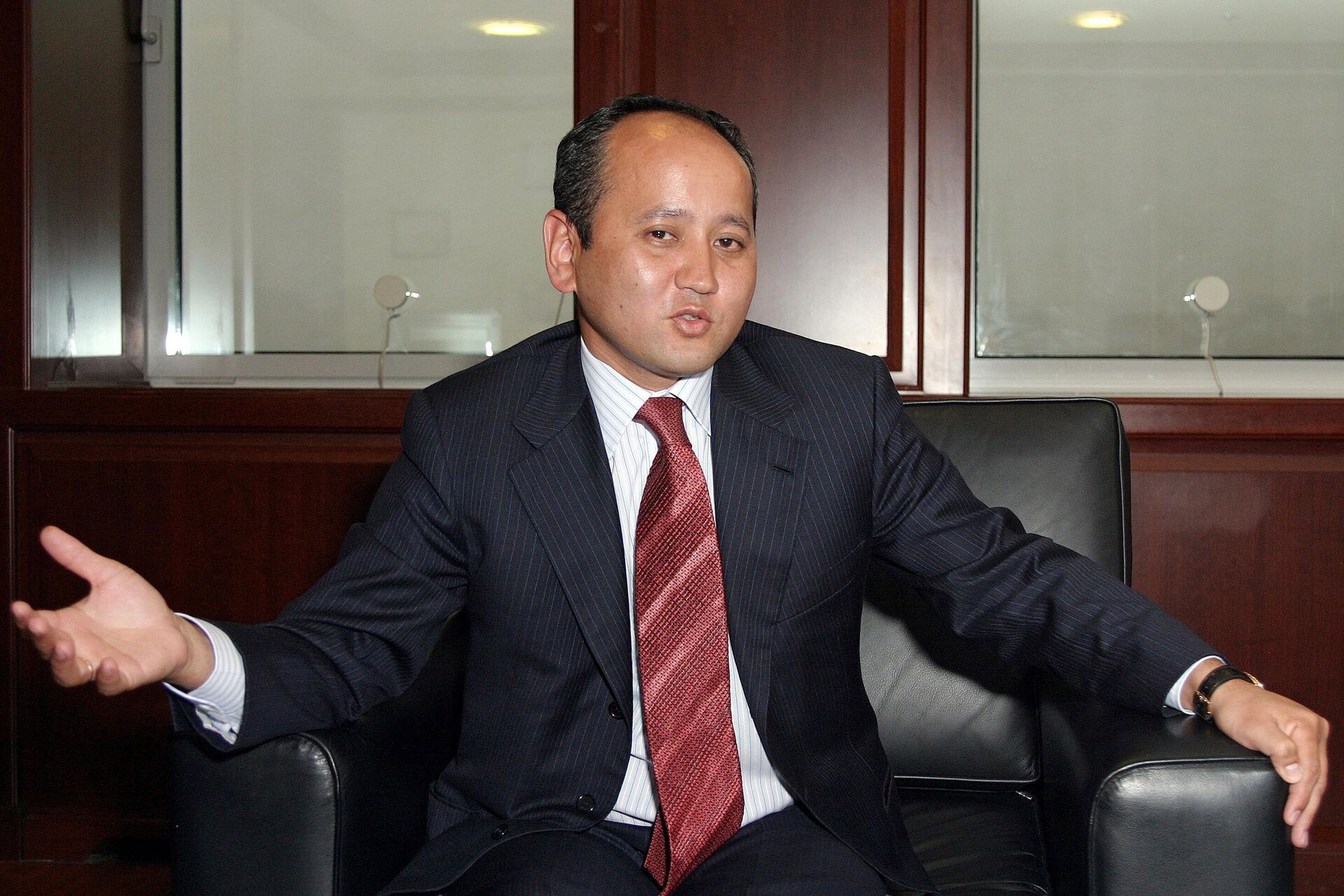White House, Western Media Shift Gears as Kazakhstan’s Tokayev Gets ‘Russian-Backed Strongman’ Label
23:31 GMT 07.01.2022 (Updated: 18:35 GMT 19.10.2022)

© Sputnik / Alexei Druzhinin
/ Subscribe
From Venezuela to Ethiopia, countries targeted for regime change by Washington inevitably see their leaders labeled as “strongmen” backed by “dictators” in Russia or China. The recent deployment of this term for Kazakh President Kasym-Jomart Tokayev as the US declares its innocence in destructive riots is thus a dark sign of times to come.
“There are some crazy Russian claims about the US being behind this,” White House spokesperson Jen Psaki said on Wednesday about the riots in Kazakhstan. “So, let me just use this opportunity to convey that as absolutely false and clearly a part of the standard Russian disinformation playbook we’ve seen a lot of in past years.”
After events in Kazakhstan took a decisive turn on Wednesday, so did western media’s orientation toward them. Now, Tokayev has become a “Russian-backed” strongman and the West has found another self-proclaimed opposition leader to drive a wedge into the country’s politics.
On January 2, Kazakhstan’s western Mangystau region saw several oil-rich towns near the Caspian Sea erupt in demonstrations over a sharp rise in petroleum prices. However, other demonstrations soon erupted in Almaty, the country’s eastern metropolis and former capital, which became far more violent. Public buildings were stormed, sacked and torched, and rioters attacked police with weapons, including rifles.
At least 4,000 rioters have been arrested, while thousands have been injured and an unknown number killed. Hundreds of police officers and national guardsmen have also been injured and at least 18 killed, including two who were beheaded. Tokyaev said Friday that roughly 20,000 gunmen had attacked Almaty and displayed evidence of foreign training.
Tokayev declared a state of emergency, said the rioters were terrorists with foreign backing, and invoked the mutual defense clause of the Collective Security Treaty Organization (CSTO). CSTO members Russia, Armenia, Belarus, Tajikistan and Kyrgyzstan have all answered the call, sending peacekeeping forces to Kazakhstan to protect public buildings but not engage in law enforcement operations.

A burned car is seen in front of the mayor's office building which was torched during protests triggered by fuel price increase in Almaty, Kazakhstan January 6, 2022
© REUTERS / PAVEL MIKHEYEV
Ablyazov Condemns Russian ‘Occupation’
Then on Friday, Reuters interviewed a former Kazakh trade minister and banker who has been hiding out in Paris from charges that he perpetrated one of the biggest financial frauds in history: Mukhtar Ablyazov. In the interview, he claimed to be leader of the opposition to Tokayev and called on the West to “tear Kazakhstan away from Russia."
"If not, then Kazakhstan will turn into Belarus and [Russian President Vladimir] Putin will methodically impose his program - the recreation of a structure like the Soviet Union," Ablyazov told Reuters. "Russia has already entered, sent in troops. CSTO is Russia. This is an occupation by Russia.”
"I see myself as the leader of the opposition," Ablyazov also said. "Every day the protesters call me and ask: 'What should we do? We are standing here: What should we do?'"
"I know the Soviet cliche of a Western spy, but I would be happy to be an American or European spy because then we would live like the people in America or Europe - and everyone would laugh," he said. "Sadly, the West doesn't help me; the West hinders me."
An article published Friday in the US state-funded Radio Free Europe/Radio Liberty’s (RFERL) Kazakh Service made a telling observation about the protests. One of the demands by protesters from the country’s unregistered Democratic Party (not to be confused with Ablyazov’s party, Democratic Choice), who claim not to be part of the violent “provocateurs” torching public buildings and shooting at police, was “the immediate deployment of foreign peacekeepers” from the CSTO “to bolster security amid the chaos.”

Former Kazakh Minister of Energy, Industry, and Trade and fugitive ex-banker Mukhtar Ablyazov
© Sputnik / Sputnik
Synchronicity With Western Media, Leaders
However, much of Ablyazov’s rhetoric has a mirror in that used by Western media and politicians, including the New York Times and US Secretary of State Antony Blinken.
Speaking Friday in Washington, Blinken said “it's not clear why they feel the need for any outside assistance,” referring to Kazakh security forces, who he said “certainly have the capacity to deal appropriately with protests.”
“We're trying to learn more about it,” Blinken added. “I think one lesson in recent history is that once Russians are in your house, it's sometimes very difficult to get them to leave."
The same language appeared in a Friday article in the New York Times, as well. An opinion piece by Andrew Higgins, the Times’ Central and Eastern Europe bureau chief, was titled “In Kazakhstan, Putin Again Seizes on Unrest to Try to Expand Influence.”
“But a series of revolts against a pro-Russian strongman could also plant the seeds of rebellion at home, analysts say,” the article’s lede adds.
“The arrival in Kazakhstan of 2,500 troops from a Russian-led military alliance amid continuing spasms of violent protest was the fourth time in just two years that Moscow has flexed its muscle in neighboring states - Belarus, Armenia and Ukraine being the other three - that the West has long tried to woo,” Higgins wrote.
“And once Russian troops arrive, they seldom, if ever, go home. Russian troops sent three decades ago as ‘peacekeepers’ to the breakaway region of Moldova and the Abkhazia region of Georgia are still there.”
According to Higgins, Tokayev is one of the “strongman leaders the Kremlin has trusted to keep order,” but before Tokayev requested CSTO peacekeepers on Wednesday, he wasn’t being referred to as Russian-backed.
Also on Friday, Jonathan Landay, a Reuters national security reporter in Washington, DC, also referred to Tokayev as “the Russian-backed president.”
“Expect to see ‘Russian-backed’ in every reference to Kazakhstan from now on, just as there are no ‘Houthis’ but only ‘Iran-backed Houthis,’” news analyst Steve Patt said in a Friday tweet in response. “Propaganda never sleeps.”
Expect to see “Russian-backed” in every reference to Kazakhstan from now on, just as there are no “Houthis” but only “Iran-backed Houthis”. Propaganda never sleeps. pic.twitter.com/wEGbLqiTV5
— 🇵🇸Left 👁 on the News (@leftiblog) January 7, 2022
On Thursday, Psaki also questioned the validity of the CSTO deployment, telling reporters that the Biden administration has “questions about the nature of this request and whether it has - it was a legitimate invitation or not.”
Other outlets have perpetuated similar misconceptions, including US National Public Radio, which said on Friday that “Russian troops are in Kazakhstan to help quell deadly anti-government protests,” and Axios, which said on Thursday that “Russian paratroopers descended on Kazakhstan's largest city Thursday to help quell the largest uprising in the history of the former Soviet republic.”
It is important to note, for the record, that the international peacekeeping force is there under CSTO direction and control, not Russian, and the organization’s rotating chair is presently held by Armenia, not Russia. Also, to reiterate the above, the CSTO peacekeepers are only in Kazakhstan to protect public buildings, not to engage in law enforcement operations.
Recycled Regime Change Playbook
This type of message coordination between US leaders, corporate media, and opposition politicians in targeted countries has been seen before on several occasions.
In Venezuela in 2019, when a no-name opposition figure named Juan Guaido arbitrarily and unilaterally declared himself the country’s interim president, despite having almost no following in the country, he got extensive support from the US and other Western powers - to say nothing of the Western media - and has been upheld by them as Venezuela’s legitimate leader instead of Venezuelan President Nicolas Maduro. Maduro has become a “strongman” kept in power by Russia and Cuba, which have been punished and demonized by the US as a result.
It was seen again in Ethiopia in 2021, when the US supported the Tigray People’s Liberation Front (TPLF) against Prime Minister Abiy Ahmed. When Abiy successfully resisted the TPLF offensive and pushed the group back into Tigray from other parts of Ethiopia they had occupied, the New York Times stepped in to portray him as a strongman being kept in power by drones supplied by like-minded authoritarians in Eritrea, Turkey, the United Arab Emirates, Iran, and China.
The former President of Bolivia, Evo Morales, was also labeled a “strongman” in 2019 by the country’s opposition, who accused him of trying to change the results of the election. Morales, too, was portrayed as an “authoritarian” propped up by other strongmen, including Maduro.
That this rhetoric has once again surfaced in the context of the riots in Kazakhstan suggests the accusations Psaki cavalierly labeled as “crazy” might not be so crazy after all.



